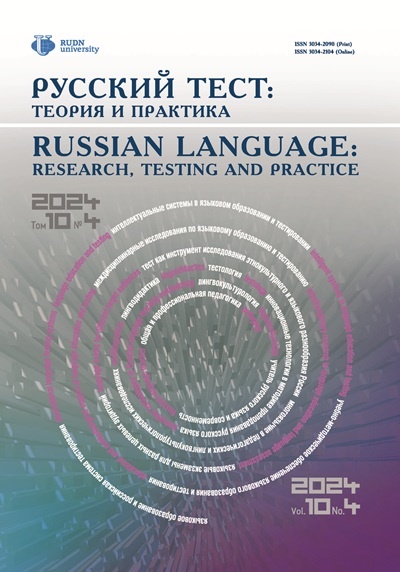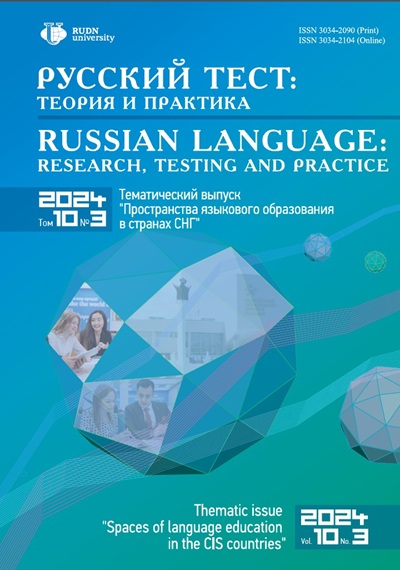Vol 10, No 3 (2024): Spaces of language education in the CIS countries
- Year: 2024
- Articles: 11
- URL: https://macrosociolingusictics.ru/russian-test/issue/view/1867
- DOI: https://doi.org/10.22363/3034-2090-2024-10-3
Full Issue
Articles
From the editors
 152-155
152-155


Linguocultural adaptation in teaching the Russian Language
Linguoculturological analysis of Russian Language textbooks for Karakalpak bilingual students
Abstract
The study of any language should be closely connected with the study of the culture of the people who speak this language. The system of representing the culture of a people in a language is studied by linguacultural studies. Co-study of language and culture contributes to the formation and development of the linguacultural competence of the student as one of the important competencies of the linguistic personality, in connection with which the application of the linguacultural approach in the practice of teaching Russian as a foreign language (RFL) is of particular importance. The author conducts linguacultural analysis of Russian Language textbooks for Karakalpak bilingual students from the perspective of developing language, speech and communicative competencies. The study examines the structure and content of the textbook edited by E.A. Khamraeva, intended for 7th grade students of secondary schools with Uzbek and other languages of instruction, from the perspective of developing linguacultural competence using an integrated approach to teaching Russian as a foreign language in the absence of a language environment. A conclusion is made about the innovative nature of the educational complex, the text materials and types of tasks and exercises of which allow simultaneous developing of language, speech and communicative skills and abilities, thereby contributing to the development of linguacultural competence and helping to overcome language and cultural barriers.
 237-243
237-243


Interdisciplinary studies of the Russian language
Sociolinguistic competence as evidence of the teacher's professional skill
Abstract
The study analyzes professionally significant areas of communication, which, according to the authors, provide an idea of the possibilities of developing pedagogical specialists from the standpoint of a competence-based approach; arguments are given about the importance of developing students' sociolinguistic competence and it is proved that sociolinguistic competence is evidence of a teacher's professional skills. In their reasoning, the authors proceed from the fact that the development of sociolinguistic competence in teachers and students of pedagogical specialties is relevant in the modern world in general and in the bilingual, multilingual context of Kazakhstan in particular. During the study, it was determined that this competence is expressed in the ability to use the metalanguage of sociolinguistics, terms and their definitions presented in regulatory documents. The authors draw special attention to the fact that in the conditions of the diverse ethnolinguistic landscape of Kazakhstan, it is extremely important to take into account modern realities, to pay attention to the specific rules of speech communication associated with the cultural and linguistic characteristics of representatives of various ethnic groups, while developing the skills of organizing pedagogical communication taking into account a specific pedagogical situation.
 200-209
200-209


The formation of interlingual lacunarity in the translation process from English to Azerbaijani as a result of cross-cultural differences
Abstract
The close interrelation between languages and cultures, and the category of lacunarity which is formed as a result of cross-cultural differences are presented in the given paper. Important factors such as customs and traditions, history, literature, religion, outlook, and the way of thinking of people are reflected in the language spoken by that people. Clear differences appeared in cross-cultural communication are explained to be the reason of the lack of compatibility between the working languages of translation. The interpretation of each subgroup is explained by the examples. Lacunar units and random lacunae are objects of the investigation. Lacunar units and lacunae together form the category of lacunarity. In the given article it is possible to get acquainted with the words and phraseological units which form lacuna in the translation process from English to Azerbaijani.
 210-217
210-217


Russian language in professional education
The formation of functional literacy skills of future teachers of Russian language and literature
Abstract
An education reform has been announced in the Republic of Tajikistan, which considers the introduction of a competency-based approach to be the main goal at the secondary school level. But obstacles arose in the implementation of the reform: the traditional authoritarian approach to teaching and educational work at school and a small number of proactive teachers with high professional qualifications who would be able to perceive new ideas and implement them in practice, in relation to the conditions of their work. To create favorable conditions for the transition to competency-based education, it was decided to teach students - future teachers - a competency-based approach. The study describes the organization of experimental training for future teachers of Russian Language and literature. The experiment involved third-year students of the Faculty of Philology who were studying the course “Introduction to the Competency-Based Approach” in the form of blended learning, i.e. independently studied the course materials on the Moodle platform, and discussed the content of theoretical material during practical classroom sessions. The study revealed a lack of functional literacy among students who graduated from Tajik-language school. Functional literacy involves understanding someone else's text and creating your own, the ability to think and analyze facts, develop your own judgment about what you read and be able to apply the information received in practice. The study provides an analysis of the situation and formulates recommendations for overcoming negative phenomena in student learning.
 179-189
179-189


Language education and testing
The functions of text and translation in bilingual educational process
Abstract
The study is devoted to the problem of using the text and its translation for educational purposes. The purpose of the study is to identify the functional features of the text and translation, their role in the formation of a bilingual linguistic personality. The current topic of the article is due to the need to study the role of text and translation in the educational process in a multilingual society where bilingualism is actively functioning in the field of education. The text, being a multifunctional phenomenon, for educational purposes it performs several functions characteristic of the field of education. In teaching a second language, Russian or Kazakh, the role of the text is significantly enhanced. It is noted that texts with didactic potential require the inclusion in the educational process of their original translations in scientific, journalistic and artistic styles, accompanied by the use of bilingual dictionaries as a means of studying languages in a natural Kazakh-Russian bilingual environment. In this regard, the linguistic and cultural component of learning is especially important, perceiving the text and its translation, students are introduced to another culture, which ultimately forms a multicultural linguistic personality. In the study, the author cites several historical facts that show the peculiarities of the development of bilingual education in Kazakh society. In the context of intercultural communication, which has become more active recently, the need for bilingual specialists is increasing not only in the scientific, educational, and professional space of Kazakhstan, but also abroad.
 190-199
190-199


Language education and testing: educational and methodological support
Polyparadigm model of educational description of Russian as a non-native language for schools in Kyrgyzstan
Abstract
The definition and description of the Russian Language as an academic subject in Kyrgyzstan, taking into account the language situation in the country and the high level of motivation of local residents to study it, is one of the pressing problems of domestic linguodidactics. In this regard, the authors, based on the analysis of existing models of describing the Russian Language (systemic-structural, Russian as a foreign language, polyparadigmatic), proposed an optimal approach to presenting educational material on the Russian Language in a Kyrgyz school. The main thesis here is the understanding that for most Kyrgyzstanis, the Russian Language is not alien, but another, familiar, language code, which, along with their native language, opens a “window of opportunity” to the big world. The proposed approach is based on the principle of text-centrism, which implies an appeal to the cognitive and linguacultural context when teaching the Russian Language through educational texts. The authors believe that in the process of working with text, a Kyrgyz schoolchild develops linguistic and communicative competence, the gift of speech develops, and the “linguistic individuality of the student” is born.
 156-167
156-167


Approaches to the design of the academic discipline “Fundamentals of Linguoculturology” in the system of pre-university education
Abstract
Designing a training course “Fundamentals of Linguoculturology” for foreign citizens is one of the high-priority tasks in the system of pre-university education. The complexity of its solution lies in the interdisciplinary nature of the scientific field, which continues the formation of the metalanguage of science, in the permanent improvement of the tools and methodological principles of linguoculturology. The study is devoted to the problem of developing a training course “Fundamentals of Linguoculturology” in the system of pre-university education for foreign citizens. The authors of the study consider the main objects of pedagogical design: a curriculum with a clear selection of significant information for study, a training manual, requirements for studying the course taking into account the level of general proficiency in Russian as a foreign language, lexical minimums prepared as a gradual series for elementary, basic and first certification levels. The types of cultural studies tasks that contribute to the development of speaking skills and the formation of cultural competence are presented.
 168-178
168-178


Linguistic View of the World in Education
National images in the mirror of linguoculturology
Abstract
The authors study and describe the processes of metaphorization in the cultural and semantic space of the Kyrgyz language using data from other languages and cultures. As a result of the study, the features of the formation of the most valuable linguacultural codes and images of the world for the Kyrgyz ethnic group were identified against the background of correlative meanings of Arabic and other languages. The material was figurative metaphorical expressions of the Kyrgyz discourse and correlative meanings in the Arabic and Russian Languages. The principles and methods of the study are a set of theoretical and methodological approaches that underlie linguacultural studies and work in the field of cognitive linguistics. The relevance and value of this and similar studies is that they reveal the features of the axiology, worldview and mental-linguistic thinking of the Kyrgyz ethnic group.
 218-224
218-224


Verbalization of the emotive concept “Fear”: Linguacognitive and linguacultural aspects
Abstract
The process of changing the linguistic paradigm determined the principle of anthropocentrism in scientific research in the field of language, that is, the orientation towards the subject, his worldview, for the study of which intralinguistic and extralinguistic factors are used. It is this fact that has determined the objectification of mental phenomena with the help of the concept of “concept”, which has got its own specificity in cognitive science and in linguacultural studies. This is one of the aspects of the relevance of the study; the second is related to the need of correcting this concept and clarify the means of its representation. The aim of the study is to analyze a significant problem of both cognitive science and linguacultural studies: the construction of the concept of “fear”, which has received the status of emotive-cognitive in a number of works, the identification of areas of intersection with related concepts, indicating the dynamics of this phenomenon. The methodology in the study is based on the conceptual provisions of these sciences. Various methods have been used, including: sema analysis, the method of dictionary definitions, the etymological analysis, and the field structuring. Results of the study: a definition of the concept of “fear” is given based on the correlation with definitions in philosophy, psychology, linguistics. Relying on the definition, a structuring of the concept related to the segmental type is produced; the core of the concept is identified, which forms segments that are semantically equivalent in terms of the degree of abstraction. A conclusion is made about the status of the concept under study: the concept of “fear” is a mental structure of the psychophysiological type.
 225-236
225-236


SCIENTIFIC EVENTS
 244-249
244-249












